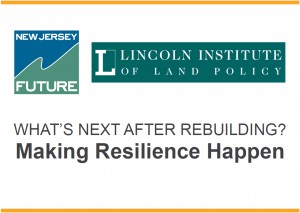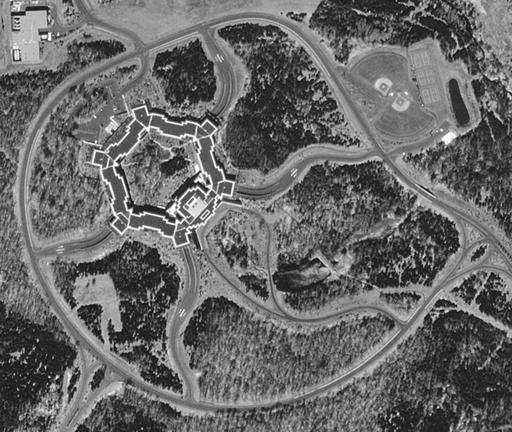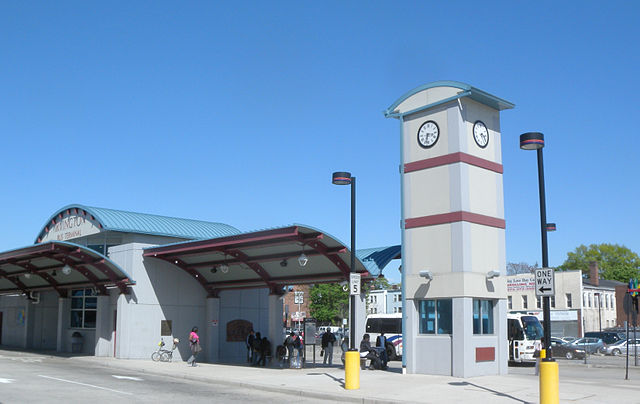New Jersey Future Blog
Lincoln Institute Symposium: Collaboration, Regional Focus Are Keys to Successful Resilience
November 6th, 2014 by Elaine Clisham
Attendees were urged to look for solutions that address multiple problems
 At the New Jersey Future/Lincoln Institute symposium on post-Sandy resilience on Oct. 30, three common themes ran through the speakers’ remarks: First, it is critical to build future resilience measures into all current rebuilding efforts; they cannot be applied retroactively. Second, common problems and scarce resources mean it’s important to collaborate across regions for solutions at the proper scale; and third, key experts from different fields – engineering, law, finance – must be involved at all stages of a project. In short, disasters are rarely of one kind, and they rarely affect one municipality in a vacuum, so it’s important to approach them holistically.
At the New Jersey Future/Lincoln Institute symposium on post-Sandy resilience on Oct. 30, three common themes ran through the speakers’ remarks: First, it is critical to build future resilience measures into all current rebuilding efforts; they cannot be applied retroactively. Second, common problems and scarce resources mean it’s important to collaborate across regions for solutions at the proper scale; and third, key experts from different fields – engineering, law, finance – must be involved at all stages of a project. In short, disasters are rarely of one kind, and they rarely affect one municipality in a vacuum, so it’s important to approach them holistically.
These themes were reinforced by speakers Anthony Flint, fellow and director of public affairs at the Lincoln Institute of Land Policy in Cambridge, Mass.; Amy Chester, the managing director of Rebuild By Design; Shalini Vajjhala, the founder and chief executive officer of re:focus partners; and Henry Coleman, an expert in public finance at the Bloustein School of Planning and Public Policy at Rutgers.
Mr. Flint highlighted the federal response post-Sandy, including its emphasis on planning for resilience against future disasters. Ms. Chester and Ms. Vajjhala both stressed that resilience was easy to understand when it is not present, that urban systems are broad-reaching and interdependent, and must be addressed using whole-systems thinking.
All of the speakers discussed the difficulty of paying for any resilience innovations, especially in a fiscal environment in which there are few new revenue sources and little flexibility within existing budgets. But they did highlight where opportunities might exist. Mr. Flint pointed out that the cost of not becoming more resilient will dwarf any new investment in resilience measures and discussed the opportunity for capturing the increased value of places where infrastructure investment has been made. Likewise, Ms. Vajjhala highlighted project-related opportunities to find revenue – either by focusing on things that cause cities to lose money, or by capturing some of the insurance savings or increased tax revenues that will result from those projects.
Prof. Coleman finished by examining whether there are funds to be found at the state level to invest in resiliency. The need is somewhere between $1.5 billion and $10 billion, he said, and pointed out that New Jersey is already in a severe financial hole after the recession, without contemplating where to find this additional funding. He suggested the best opportunity for new revenue would come from better use of our existing tax streams: phasing out exemptions in our income tax; expanding our sales/use tax to categories such as Internet sales and items such as gas, alcohol, and tobacco; substituting credits for exemptions for necessities like food and clothing; and capping the tax incentives and subsidies given to employers to relocate or stay in New Jersey. All of these, he said, would generate additional revenues.
It was clear from the presentations that no one idea or financing source will solve all of New Jersey’s resilience needs, and that we need to be looking both at innovative solutions and at multiple revenue streams to fund them.
View a video of the entire symposium (please note the video may not have been edited; symposium begins at approximately 14:00)
Presentations:
















